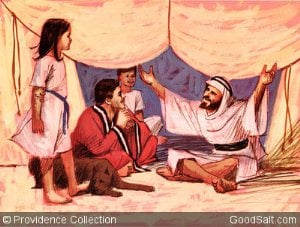Tuesday: Scripture and Tradition
When Jesus walked this earth there was no New Testament.
The Bible of Jesus was the “Old Testament.” But, from the start, obedience to Jesus’ spoken words was the wise thing that His followers did (Matt. 7:24-27). Jesus’ words and actions continued to be authoritative for the church in the years that followed (1 Thess. 4:15, Acts 20:35, 1 Cor. 11:23-26). Then, through the inspiration of the Holy Spirit, the apostles were guided to rightly interpret the words of Jesus and the significance of His actions (John 15:26–27; 16:13-15). And before the first generation of Christians had passed off the scene, the writings of the apostles were considered fully equal to those of the Old Testament prophets and could be called “Scripture” (2 Pet. 3:2, 16).
Read 2 Thessalonians 3:6-8, 3:14. According to these texts, what would Paul include in his concept of truth?
By the time Paul arrived in Thessalonica, the early church considered the sayings of Jesus and the teachings of the apostles as supremely authoritative. “Tradition,” in New Testament times, was not necessarily a dirty word; it could refer to the church’s memory of the sayings and actions of Jesus and include the oral teachings and writings of the apostles. Tradition was to them much the same as the Scriptures are to us. It could be commanded and was to be obeyed.
For the Thessalonians, tradition meant more than just the letters of Paul. It included all that Paul had said to them while he was in Thessalonica, and included also his actions, which they were to imitate. The fact that Paul worked hard to support himself in Thessalonica did not merely show that he cared for them (1 Thess. 2:9); it was a “tradition” that he expected them to apply to their own lives.
Paul was not idle while he was among them; he did not eat other people’s food without payment. He labored “night and day” so as not to be a burden to anyone. And anyone in Thessalonica who lived differently was “out of order.” So, Paul’s definition of disorderly people was not limited to those who were disruptive in the church or community; he broadened it here to include anyone who did not follow the teachings or practices of the apostles.
These texts reveal how important Paul’s actions were for the Thessalonians. Though he had truth directly from the Lord (Gal. 1:1), He bore witness as much by His life and actions as by His words. How well do our lives reflect the truths that we have been given?


As Adventist Christians we have to be careful with tradition, while it can be a good thing as in Pauls’ time, it can be used to misrepresent Jesus words.
Just as in Paul’s days we should continue to apply these principles to our daily lives. This is so important as our daily lives are a living testimony.
Whose tradition should be followed when one becomes a Christian? Should one forsake his or her tradition (which is not contrary to bible truths) for the other which is said to be acceptable in the church..?
As a Christian we must discard all traditions that go contrary to the Bible. There are traditions that are in conformity and does not in anyway go contrary to our beliefs, these we should not discard. For example there are those that encourage peacefull co-existance, respect to the old, leaders and peers.
My dear Sabelo, to your question I say that, test everything (in this case tribe/race tradition, church tradition) with scripture (the word of God) and hold fast to that which is good. God bless.
Which traditions are we talking about here? Traditions are practices cherished for some time. We have traditions that are in church. Mode of worship, time we come to church, how we carry bible study? Has it changed for the worse?
We have embraced easy way of worship which glorifies our passion than what God commanded us.
Customs are different.
As stated in the lesson, tradition does not mean something bad, tradition use for application of God’s words. We are not to practise tradition of men, however, there is the Tradition of God, Obeying what the word of the Lord said to us.
Yes as Adventists we should practice the tradition of God that is by doing what GOD instructed us to do, not the tradition of man vecause God is our creator.